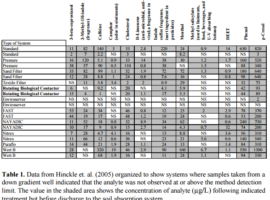Contaminants of Emerging Concern from Onsite Septic Systems – Whitepaper
Authors: George R. Heufelder M.S. R.S.Published: 2012
This project was funded in various proportions by the Massachusetts Department of Environmental Protection with funds from the United States Environmental Protection Agency under the Section 319 Competitive Grants Program. The grants were made to the Barnstable County Department of Health and Environment, the operators of the Massachusetts Advanced Septic System Technology Center. The contents of these reports do not necessarily reflect the views or policies of the departments mentioned nor does the mention of any products, trade names, or companies constitute an endorsement.
Abstract
Many rural areas of the United States continue to rely on onsite septic systems as a permanent means of wastewater treatment and disposal. This is also the case in Barnstable County (Cape Cod) which is designated by EPA as having a sole-source aquifer and where over 80% of the wastewater treatment is performed by onsite septic systems. To assess the implications of onsite wastewater disposal in this area where septic systems are hydraulically connected with drinking water sources and aquatic habitats, we have compiled information on the state of our understanding relative to the impact of certain contaminants of emerging concern (CEC) that originate in wastewater. These include pharmaceuticals (antibiotics, hormone therapies, cancer therapies, etc.), personal care products (deodorants, shampoos, insect repellants, etc) and certain byproducts of manufactured products (phenolic surfactants, fire retardants, etc).
Studies conducted on Cape Cod and elsewhere confirm the potential for impacts to human health and the environment related to CEC. We review three aspects of CEC and onsite wastewater treatment/disposal that we propose are of highest priority: endocrine disruption by selected CEC, the effect of antibiotic pharmaceuticals, and direct toxic effects of selected CEC. The rationale for prioritizing concerns in this manner is discussed.
Finally, we review available studies regarding onsite septic system technologies, including advanced treatment. We suggest design changes to standard soil absorption systems that several of the published studies reviewed herein suggest would improve performance for the removal of CEC. The authors concede that further research is necessary to validate the efficacy of these recommendations.

